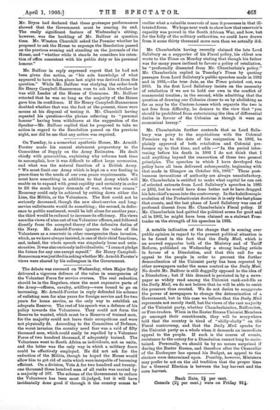The debate was resumed on Wednesday, when Major Seely delivered
a vigorous defence of the value in emergencies of the Volunteer Force for service oversea. The real reduction should be in the Regulars, since the most expensive parts of the Army—officers, cavalry, artillery—were bound to go on increasing. Mr. Arnold-Forster in reply defended his scheme of enlisting men for nine years for foreign service and for two years for home service, as the only way to establish an adequate Reserve. The rest of his speech was a defence of his policy towards the Volunteers. They could not form the Reserve he wanted, which must be a Reserve of trained men, for the majority could not leave their occupations and were not physically fit. According to the Committee of Defence, the worst invasion the country need fear was a raid of fifty thousand men, which could easily be repelled by a Volunteer Force of two hundred thousand, if adequately trained. The Volunteers went to South Africa as individuals, not as units, and the latter was the only way in which a military force could be effectively employed. He did not ask for the reduction of the Militia, though he hoped the House would allow him to get rid of units which were incapable of becoming efficient On a division, Vote A for two hundred and twenty- one thousand three hundred men of all ranks was carried by a majority of 107. The scheme of the Government to reduce the Volunteers has been most ill-judged, but it will have incidentally done good if through it the country comes to realise what a valuable reservoir of men it possesses in that ill- treated force. We hope next week to show how that reservoir's capacity was proved in the South African War, and how, but for the folly of the military authorities, we could have drawn from it some thirty thousand more men than we actually did.






































 Previous page
Previous page